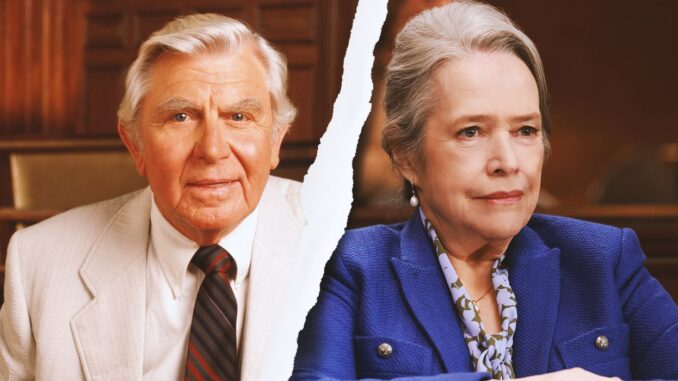
The golden-hour glow of Atlanta, the crisp cut of a pale blue suit, the folksy charm of a lawyer who could coax a confession out of a stone. This was the world of Matlock, a world where justice, while sometimes a little slow, always prevailed. It was comfort food television, a balm for a weary soul, a testament to the idea that common sense and a good heart could always untangle the most knotty of crimes.
But what happens when the golden hour gives way to twilight? When the blue suit is stained with something darker than coffee, and the folksy charm becomes a weapon of subtle manipulation? This is the landscape where Kathy Bates, in her glorious, unvarnished brilliance, re-enters the fray, ready to usher in a Matlock comeback more twisted than ever.
Kathy Bates isn’t just “back”; she never truly left. Yet, there’s a renewed collective appreciation, a cultural acknowledgment of her singular power. She is an actress of profound gravitas, a master of embodying the very complicated, often uncomfortable truth of the human condition. From the terrifyingly unhinged Annie Wilkes in Misery to the steel-spined Dolores Claiborne, from her chameleonic turns in American Horror Story to her poignant resilience in countless other roles, Bates possesses an ability to be simultaneously formidable and vulnerable, deeply unsettling and profoundly empathetic. She doesn’t play characters; she inhabits souls, unearthing their deepest scars and their most resilient strengths. This isn’t an actress who seeks to be loved; she seeks to be understood, even if that understanding is chilling.
And this, precisely, is why she is the perfect, unholy shaman for a “twisted Matlock.” The original Matlock, played by the inimitable Andy Griffith, operated within a clear moral universe. There were bad guys, there were good guys, and justice was a quantifiable thing, often delivered with a wink and a cleverly laid trap. But in our present moment, where truth is contested, institutions are questioned, and the very concept of justice feels like a malleable construct, a straight-faced Matlock revival would be anachronistic, if not laughable.
No, the twisted Matlock isn’t about solving clear-cut cases; it’s about navigating the murky depths of systemic rot, psychological manipulation, and the corrosive nature of power. Imagine Bates not as Matlock, but as the Matlock, a Matlock for a new, jaded age. Not Benjamin Matlock, but perhaps Bernadette Matlock, a woman who has seen too much, done too much, and now operates not from a desire for traditional justice, but from a deeply cynical, perhaps even vengeful, understanding of how the world actually works.
Her office wouldn’t be pristine, but cluttered with ancient law books, forgotten case files, and perhaps a half-empty bottle of bourbon. Her blue suit would be replaced by a worn cardigan, her Southern charm by a wry, knowing gaze that could strip a man naked of his pretenses. The “twist” isn’t just about making Matlock dark and gritty; it’s about deconstructing the very idea of courtroom drama.
Perhaps Bernadette Matlock doesn’t even practice law anymore. Maybe she’s a retired judge, or a former prosecutor disgraced for unorthodox methods, now operating from the fringes. Her “clients” aren’t just innocent people; they might be those who simply deserve a justice, even if it’s not the kind codified in law books. She wouldn’t trick confessions out of guilty men; she’d psychologically dismantle them, revealing not just their crime, but the rot within their souls, the societal failures that shaped them. The confessions wouldn’t be neat, triumphant moments, but terrifying insights into human depravity, leaving the audience, and perhaps even Bernadette herself, deeply unsettled.
The cases wouldn’t be simple whodunits; they’d be tangled webs of generational trauma, corporate malfeasance, political corruption, where the “villain” might be a beloved community figure and the “victim” far from blameless. Bates, with her incredible range, could embody this Matlock. Her knowing glances, her unexpected bursts of warmth that quickly turn icy, her ability to convey profound exhaustion and terrifying resolve – all would be tools in this twisted courtroom.
She would be the Matlock who understands that sometimes, the law isn’t enough. Sometimes, you have to break things to fix them. Sometimes, the only way to expose true darkness is to dabble in it yourself. Her “folksy wisdom” would be laced with a bitter edge, her moral compass recalibrated by years of witnessing the worst of humanity.
This isn’t a cynical reboot for reboot’s sake. This is a brilliant marriage of talent and concept. Kathy Bates’s return to such a defining, complex role would elevate a “twisted Matlock” from a mere gimmick to a profound exploration of justice in an unjust world. It would force us to confront uncomfortable truths, to question our own assumptions about right and wrong, and to marvel at the actor who, with every nuanced gesture and searing line delivery, lays bare the twisted, beautiful, terrifying heart of humanity itself. The blue suit is gone, the comfort food flavor is replaced by a potent, addictive bitterness, and Kathy Bates is here to serve it up, no apologies. And we, the audience, will devour every twisted bite.
